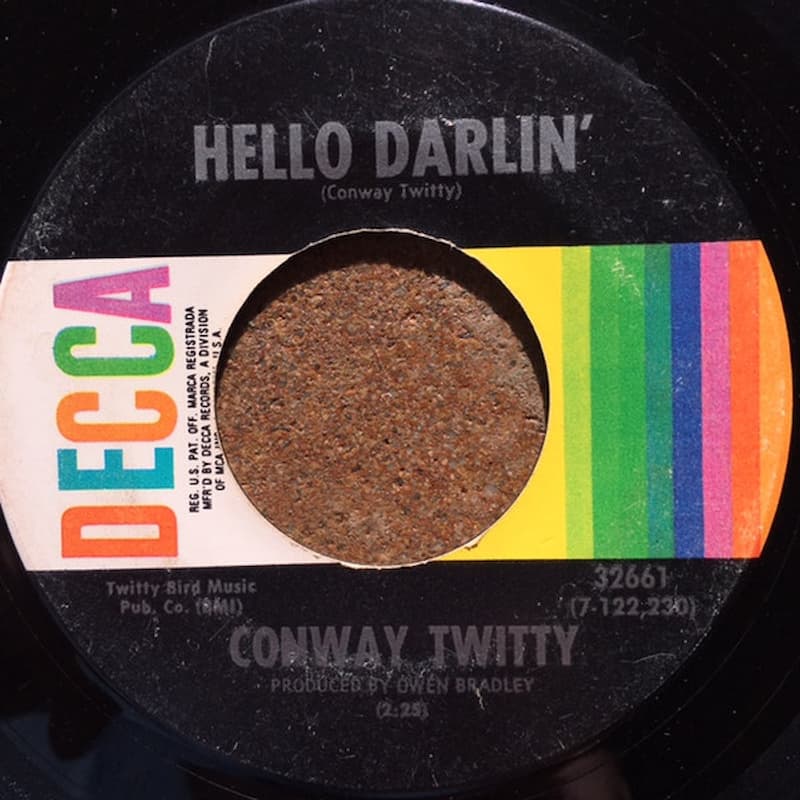
In 1966, Conway Twitty made a bold move that would forever alter the trajectory of his music career. Reinventing himself as a country singer and launching a television show in Oklahoma City, his half-hour program quickly became a regional sensation. This was the resurgence of Twitty’s star, this time soaring in the world of country music.
At the age of 34, Twitty caught the attention of legendary producer Owen Bradley and Decca Records, who signed him. His initial singles barely made waves until “The Image of Me,” penned by his neighbor Wayne Kemp, hit #5 on the charts. Then came his first #1 record in 1968, “Next In Line,” also written by Kemp.
Twitty’s audience navigated the cultural shift alongside him, transitioning from his rock ‘n’ roll roots to country fans. It was in 1970 that he struck gold with a song he’d shelved a decade earlier—“Hello Darlin’”. Originally written in 1960 during his rock ‘n’ roll days, the tune was buried in a cardboard box and forgotten amid the changing tides of his musical journey.
Rediscovery came when Twitty sifted through old songs to fill country albums. “Hello Darlin’” was a strange find—it lacked a chorus and hook line. Even Twitty was unenthusiastic initially, but Owen Bradley had a vision. He named the song after its opening line, introduced an electric piano played by Larry Butler for a fuller sound, and most importantly, pioneered a game-changing twist: Conway would speak the first two words instead of singing them.
This subtle yet powerful innovation transformed “Hello Darlin’” from merely a good song to a country music phenomenon. It struck a chord, especially with women in his audience, who erupted in applause at every concert—twenty years strong.
Decca Records, noticing the fervor, released it as a single while another Twitty hit was still climbing the charts. The gamble paid off: “Hello Darlin’” soared to #1 on Billboard’s Hot Country Singles chart by June 6, 1970, dominating the top for a full month and remaining on charts for five months.
The song encapsulated Twitty’s hallmark style: emotional, raw, and speaking directly to the hearts of women. It set the tone for hits like “Fifteen Years Ago,” “She Needs Someone To Hold Her (When She Cries),” and “Slow Hand.” His powerful voice and sensitive lyrics solidified him as a country icon.
Remarkably, the legacy of “Hello Darlin’” extended beyond Earth. In 1975, Brigadier General Thomas P. Stafford, commander of the Apollo spacecraft, loved the song so much he requested Twitty to record a Russian version, entitled “Privet Radost.” Twitty collaborated with the University of Oklahoma’s Russian language chair to master the pronunciation, creating a historic musical gift for the Apollo-Soyuz mission.
Witnessing the July 15 launch at Cape Kennedy, Twitty watched the historic U.S.-Soviet docking from Oakland, with “Privet Radost” serenading this new chapter in space exploration—embedding a country melody into space history.
Before his untimely death in 1993 at 59, Conway Twitty had amassed an astonishing career: 29 consecutive Top Five singles, 75 Top Ten hits including 40 number ones, ranking him as Billboard Magazine’s fourth most successful country artist of all time.
His stunning journey from rock ‘n’ roll beginnings to an unforgettable voice in country music was forever marked by “Hello Darlin’”—a song that was nearly lost, yet ultimately became an anthem that touched millions, on Earth and beyond.